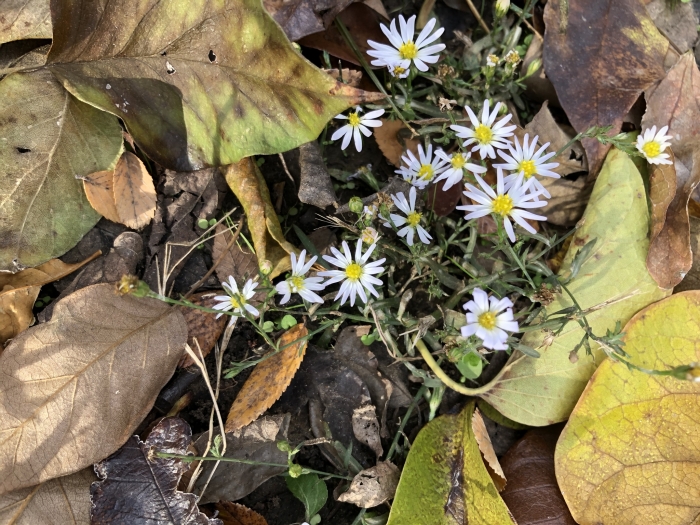Southern Annual Saltmarsh Aster
(Symphyotrichum divaricatum)
Southern Annual Saltmarsh Aster (Symphyotrichum divaricatum)
/
/

By jeanhm no rights reserved
Public Domain
Image By:
By jeanhm no rights reserved
Recorded By:
Copyright:
Public Domain
Copyright Notice:
Photo by: By jeanhm no rights reserved | License Type: Public Domain | License URL: http://creativecommons.org/publicdomain/zero/1.0/ | Uploader: jeanhm | Publisher: iNaturalist |

















































Estimated Native Range
Summary
Symphyotrichum divaricatum, commonly known as Southern Annual Saltmarsh Aster, is an annual herbaceous plant that thrives in coastal salt marshes, estuarine margins, and brackish wetlands in the southeastern Uand Southwestern nited States as well as Mexico. It can vary greatly in size, typically growing between 60 and 200 centimeters (2 and 6+1⁄2 feet), but in less ideal conditions, it may be as short as 10 cm (4 in). This species is notable for its lavender to blue ray florets that encircle bright yellow disk florets, blooming profusely from July through November and sometimes extending into February. The flowers are moderately showy and attract a variety of pollinators.
Southern Annual Saltmarsh Aster is valued for its adaptability to wet conditions and its ability to thrive in part shade, making it suitable for rain gardens, wetland restoration projects, and as a naturalizing element in coastal landscapes. It requires high amounts of water and prefers soils with medium drainage. While it is not commonly used in traditional garden settings, its striking flower display and extended blooming period can provide visual interest in naturalized areas. Gardeners should be aware that, being an annual, it will need to reseed itself or be replanted each year.CC BY-SA 4.0
Southern Annual Saltmarsh Aster is valued for its adaptability to wet conditions and its ability to thrive in part shade, making it suitable for rain gardens, wetland restoration projects, and as a naturalizing element in coastal landscapes. It requires high amounts of water and prefers soils with medium drainage. While it is not commonly used in traditional garden settings, its striking flower display and extended blooming period can provide visual interest in naturalized areas. Gardeners should be aware that, being an annual, it will need to reseed itself or be replanted each year.CC BY-SA 4.0
Plant Description
- Plant Type: Herb
- Height: 0.5-3 feet
- Width: 0.167-1 feet
- Growth Rate: Moderate
- Flower Color: Purple, Pink, White
- Flowering Season: Summer, Fall
- Leaf Retention: Deciduous
Growth Requirements
- Sun: Part Shade
- Water: High
- Drainage: Medium
Common Uses
Bee Garden, Bird Garden, Butterfly Garden, Low Maintenance
Natural Habitat
coastal salt marshes, estuarine margins, and brackish wetlands in the southeastern Uand Southwestern nited States as well as Mexico
Other Names
Common Names: Lawn American Aster, Narrowleaf Aster, Saltmarsh Aster
Scientific Names: , Symphyotrichum divaricatum, Symphyotrichum subulatum var. ligulatum, Aster subulatus var. ligulatus, Aster divaricatus var. persaliens, Erigeron multiflorus, Aster divaricatus var. divaricatus, Aster exilis f. exilis, Tripolium divaricatum, Aster divaricatus var. curtifolius
GBIF Accepted Name: Symphyotrichum subulatum var. ligulatum S.D.Sundb.